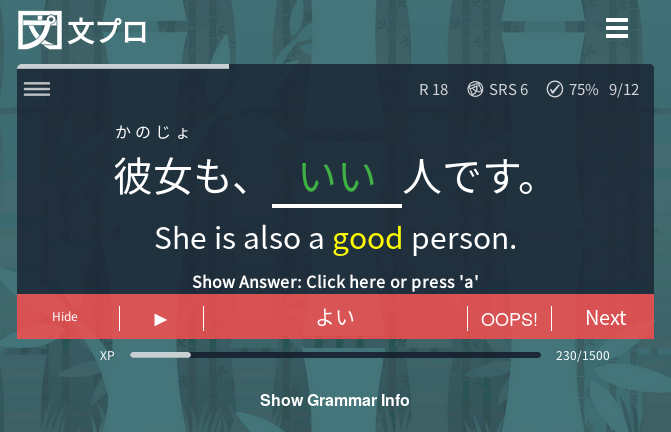adjective meaning 'good’
Structure
- Present: いい
- Present Neg: よくない
- Past: よかった
- Past Neg: よくなかった

adjective meaning 'good’
Structure
- Present: いい
- Present Neg: よくない
- Past: よかった
- Past Neg: よくなかった
Do the other forms besides present show up in reviews? Or do I have to make custom ones for that to happen?
There are sentences with non-past, past negative and past forms besides non-past(present)
For lessons like this, I think it would be nice to be tested on all the forms. Similar to wanikani where you have to get the reading and meaning correct to successfully complete the review.
Hey 
Using all the forms of grammar point and words that are often used together with it is one of the standards at Bunpro 
Shouldn’t it accept よい as an alternative answer to いい ?
I know the latter is more common, but よい is technically correct too, isn’t it?

Yes you are right! 
I will add it as an alternative answers right now!
Edit:
Added 
So in other words, this lesson teaches the conjugation of https://www.wanikani.com/vocabulary/良い
Why then does this come before the lesson on い-adjectives? 
I think an important point to make is that some adjectives/expressions are conjugated like 良い because they are derived from two words together.
かっこいい and 気持ちいい are two common examples where the past tense form would be かっこよかった and 気持ちよかった. Note that this doesn’t apply to かわいい because it doesn’t use the same kanji.
Jisho.org actually has a list of ‘yoi/ii class’ adjectives.
The kanji for 可愛い are ateji anyway. The reason it doesn’t apply is that it’s not derived from 良い but from 顔 and 映し (かわはゆし ~ “red faced”).
Please can this Grammar point be added to the MNN1 path? (chapter 8 is mentioned in the resources) Thank you 
A little confused on the conjugation of this topic.
Does using ’いい’ require the the use of ’だ’ or ’です’?
For example, I noticed in the first example we do in fact use ’だ’,
eg,
これはいい映画えいがだ
However, the ‘だ’ is dropped in further examples that use the post form (positive and negative).
So, is the conjugation imply the ‘is’ portion?
Do we need to use "だ " in the present tense affirmative case? ,
Eg, would これはいい映画えいが be a valid sentence (as opposed to これはいい映画えいがだ)
Let me know if I’m thinking about this the right way or if may questions make sense.
Thank you.
The だ in this sentence has nothing to do with the いい. The いい just modifies 映画 so we’re talking about a “good movie” instead of just a “movie”. You can treat いい映画 as a noun phrase, it could be replaced with anything else that can act as a noun (such as just 映画 by itself), and the rest of the sentence wouldn’t change. That there is a だ in this sentence is because it’s a typical AはBだ type of sentence.
In many of the other examples, いい is the main clause’s predicate, e.g. これは良くない. In that case, adding だ is not grammatical.
In the question sentences for this grammar point you’ll sometimes see です added after よくない or よかった etc. This is a special exception for です, where it doesn’t have a grammatical function, and only acts as a “politeness particle”. But this is only possible with です, we can’t use だ in those cases.
Thank you for clarifying that! です as a politeness article was throwing off my understanding.
Hello! I’m new here, so sorry if responding to this old thread isn’t the right thing to do when I have questions about a particular grammar discussion.
I’m going through these grammar points for the first time with the default “Bunpro N5 Grammar” deck that it selected for me. I am just wondering about the order of things here? The grammar SRS is asking questions about using the past form of いい here (e.g. "The test was not good / テストはよくなかった ). It feels really weird to have that though, considering that there hasn’t been a grammar point yet for how to conjugate anything in the past tense? So it is hard to follow what exactly is being done to get this into the past test, and if this is “normal” for past test (like where did this な come from? Why wouldn’t it be ない?), or something specific to いい. From the grammar point I thought the corresponding SRS was just going to be “if you are negating いい, then say よくない instead of いいない” and not “…and also make sure you know how to use past tense too.”
The grammar point also is talking about how いい conjugates differently than other い-adjectives… but there really hasn’t been any conjugation lessons about い-adjectives yet? Just that い-adjectives exist, and you shouldn’t use だ with them…
Bunpro is the first time I’m learning any Japanese grammar, so maybe these are really simple points, but how it is is laid out right now is just kind of confusing 
Also am very confused … just been shown this, without having been introduced what “い-adjectives” are and that (or how) adjectives are being conjugated.
did i miss something? Shouldn’t there be something about adjectives, the types, and their conjugation, before this is dropped onto the learner?
I was confused too just now so I went to Google. Here’s what I found:
Non-Past Form(~ない)
Non-Past Negative Form(~ません)
Past Form(~した)
Past-Negative Form(なかった)
I was confused too just now so I went to Google. Here’s what I found:
Non-Past Form(~ない)
Non-Past Negative Form(~ません)
Past Form(~した)
Past-Negative Form(なかった)
I agree with what people before have said. It feels a bit off to jump straight to past tense and conjugation without any proper introduction to the topic.